 Gaming news is a bit thin on the ground during the lean months of summer. Lucky for us, in the land down under, it’s winter, and the Penny Arcade folks took the PAX convention down there over this past weekend. The problem being, I sure as hell don’t have the money to take my black ass to Australia for a weekend, and if I did, most of that time would be spent either trying to find and slap members of the Classification Board, or stalking Yvonne Strahovski. So, we decided to gratefully enlist the help of a few of the natives, the two men we know on our message boards as The Rain Dog and Workyticket, to head to the show, and report back.
Gaming news is a bit thin on the ground during the lean months of summer. Lucky for us, in the land down under, it’s winter, and the Penny Arcade folks took the PAX convention down there over this past weekend. The problem being, I sure as hell don’t have the money to take my black ass to Australia for a weekend, and if I did, most of that time would be spent either trying to find and slap members of the Classification Board, or stalking Yvonne Strahovski. So, we decided to gratefully enlist the help of a few of the natives, the two men we know on our message boards as The Rain Dog and Workyticket, to head to the show, and report back.
PAX Aus has, from its inception, been A Very Big Deal, not just for the Penny Arcade crew but for Australia itself. With no significant gaming events of our own, we’ve come to perceive these conventions as ethereal, almost mythical beasts, existing only as annual bursts of excitement (from fans), marketing (from publishers) and complaining (from games writers). The Internet may have allowed us vicarious flashes of the experience, but in the end they have remained fodder for the imagination only.
On July 19th, the first day of PAX Aus, the imagining finally made way to reality as people from all over the country convened at Melbourne Showgrounds for the international debut of Penny Arcade’s flagship event. What followed were three days of spectacle, excitement and a sense of unity Aussie gamers rarely get the chance to fully share.
To describe the atmosphere dominating the first morning as ‘electric’ is, of course, a complete and utter cliché that should by rights have us shot for using, so we won’t.
It was, though.
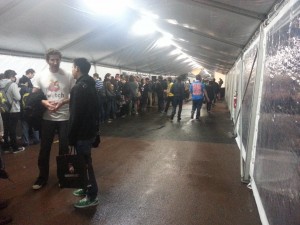
The number one pastime at PAX Aus.
With smiling punters as far as the eye can see, the morning lines had less an air of waiting as that of Christmas dawn, the strong cosplay contingent ensuring that even the inaction of standing in line yielded plenty of nice distractions (Especially a couple of Bioshock Elizabeths who could’ve coaxed the corset fetish out of a granite nun).
It’s just as well, because there was plenty waiting to be had. The organizers had clearly underestimated the number and enthusiasm of attendees, with every panel attracting people in the hundreds. With most panels being held in rooms that were woefully inadequate for the demand (Friday’s Bioware panel, for example, had a capacity of 400) people were needing to queue up to two hours in advance to guarantee admission.
Not easy when there was so much going on to see and do. You could fill a couple of days alone with the main floor, with a dizzying array of booths ranging from the impressive (The monstrous World of Tanks booth with real tank), to the glossy-but-shallow (Ubisoft) to the, well, rowdy. This honour was owned solely by League of Legends, whose massive setup running all-day tournaments with screaming crowds that never flagged once over the weekend.
Funny enough, the AAA publishers had the least to offer, with the F2P and Indie booths offering the most interesting and entertaining fare, especially the plethora of Australian Indie developers boasting fascinating titles. Standouts included Pixel Pickle’s Burden, a literal tower defense game where you essentially play a tower on legs, the delightful Wolfdozer, a cross between the original GTA games and the Three Little Pigs and Metal Dead:Encore a charming heavy metal zombie themed point and click adventure. Also impressing with a gorgeous standalone booth was Armello, an extremely fun-looking collectible card game/RPG/action title coming to mobile devices with an impressively polished Wind in the Willows/Secret of NIMH vibe to its art direction.
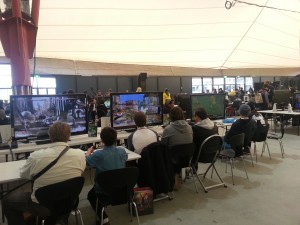 Freeplay areas
Freeplay areas
Divided into console, PC and board/card gaming areas, a huge area of the convention was given over to a smorgasbord of gaming goodness. Pretty much anything you could imagine was available, including a range of retro consoles playable on old-school CRTs. And if you ever needed a summary of the console mentality versus the PC player mentality, the strictly systematized and timed PC room couldn’t have been more different to the easy-going and fairly chaotic console area.
Ubisoft
Clearly wanting to dangle a carrot in front of jaded Aussie gamers in the leadup to the highly controversial latest installment in the Saints Row saga, Ubisoft provided the chance to play a section of the game on 360 – at least, to those willing to undergo the 40-or-so minute line snaking around the unassuming, blacked-out booth.
Playtime was severely limited (Maybe ten minutes at most), but it was enough to make clear that fans of Saints Row The Third will be completely comfortable with this game, as long as they’re not expecting much in the way of innovation. It’s the same engine, control and even menus, with visuals on par, only with the addition of superpowers to spice up the mix. A quick test of the new super-jump and glide mechanics pretty much ate up the playtime, with no chance to really see how the cuts have impacted the Safe for Antipodean Consumption Edition, but it was enough to deliver the point that it’s Saints Row as we know and love it. Whether that will be enough remains to be seen.
The main Ubisoft booth was flashy but uninteresting, unless Just Dance competitions are your thing. However, a Watch Dogs promo yielded some new footage, and the odd snifter of information that essentially boiled down to ‘moral choices in the game will be reflected in the game’. Otherwise, Ubisoft’s contribution was pretty much Saints Row, with very little else going on.
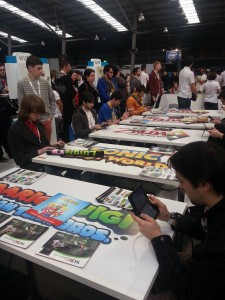
Streetpasses: the second most swapped thing at PAX, apart from the flu virus.
Total War: Rome 2
Creative Assembly had an impressive closed 45 minute presentation on Total War: Rome 2 which essentially showed the latest trailer and had one of the presenters play through the Battle Of The Nile on site. Long story short: We want this thing now. The game looks gorgeous, and the political and diplomacy sides have been buffed up significantly, giving an almost Crusader Kings 2 vibe to the grand strategy side of the title.
While the CA reps dodged around the question, it’s not difficult to wonder if Paradox’s glorious intrigue-em-up has rubbed off on the team. Either way, it’s good news for strategy gamers and a welcome addition to the Total War formula. Now begins the long, painful wait till October…
Oculus Rift
The Oculus guys were keen to stress that PAX Australia was the first public unveiling of the HD Oculus kit, and it turned out to be the surprise highlight of the show. Running a brief, non-interactive demo in Unreal Engine 4 (Essentially a rejig of the UE4 “Elemental’ demo that’s been doing the rounds for a while), the experience is frankly stunning, with one-to-one headtracking providing the most convincing representation of the first-person perspective we’ve ever seen. You turn, and the world sways with your head; you look behind you, and instead of the perfectly level rear-view you get in most first-person games you get the same skewing of view you get in real life.
It’s wild stuff, making you realize just how stylized the simple act of looking around is in first-person games, and while the team admit that there are limitations still to be addressed what they have may well turn out to be the future of first-person gaming. Incredibly, they’re aiming to release the kit to retail for US$300 – not exactly pennies, but still a hell of a lot cheaper than what it looks like it should cost. Our first oculus experience caused a level of childlike glee that was as refreshing as it was surprising. Now all we need is the hover car and jet pack.
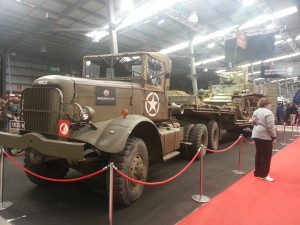
In case Randy Pitchford opens his mouth again.
The Panels
The weekend kicked off with Ron Gilbert’s hugely enjoyable keynote. Jumping off from his admission the he knows ‘fuck all about the creative process’, it explored it as something to be celebrated rather than dissected. Of the fans, cosplayers and developers comprising the PAX audience, Gilbert reassured that ‘you are all something we should all strive to be: creatives’. From many other people this stuff would sound rote and twee, but then again not everyone made Monkey Island.
The Bioware panel was something of a mixed bag, with the team reiterating several times that they could not talk specifics about the upcoming Dragon Age: Inquisition. While this meant that the discussion occasionally bordered on the fluffy, their reiteration of the phrase ‘It’s your world, your story, your characters’ seemed to bolster the general sense that this game would skew more towards Origins than Dragon Age 2, including a bigger, more explorable world like the first game. There was a lot of talk about how your decisions would shape the events of the game, but the return of Morrigan created the strongest buzz in the room.
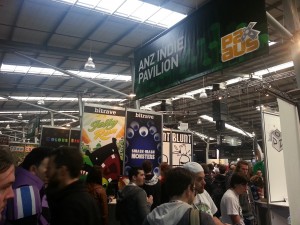
Australia to Ubisoft: “That’s not a booth. This is a booth!”
An easy highlight of the weekend was the strong showing from Australian indie developers, and Friday’s Aussie Indie Showcase panel made for an informative and frequently hilarious introduction to some dedicated and ridiculously talented guys, including Alexander Bruce (Creator of the wonderfully demented Antichamber) and Lance McDonald from Man Fight Dragon, whose promising-looking Black Annex, an 8-bit scifi strategy title that harkens back directly to the old 90’s Syndicate games, garnered a lot of attention over the weekend. While much of the panel predictably hovered around the trials of indie development, an interesting discussion arose around Steam’s Greenlight system, described as both productive to devs willing to market their game, but also possibly restrictive to an audience if it’s not big enough. As Improptu Games’ Joe Wintergreen put it:
“25,000 people vote yes on this game – my problem is, I can’t sell it those people… If half of the people who voted yes on my game already could buy it right now, sweet, I can make the next one. But currently none of them can.”
It’s a conundrum that has no easy answer, but Alexander was quick to point out that it was in many ways preferable to the old days where Steam would accept or reject submissions with a ‘no feedback’ policy that would leave devs none the wiser as to the reasons for their success or failure.
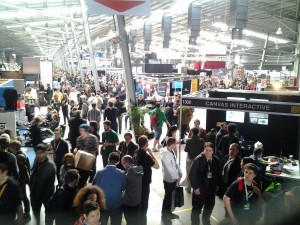
A quiet moment at PAX.
As sundown crept on Sunday, so ended a major chapter not just in the history of PAX, but in Australian gaming. With Aussie indie devs out in force and often stealing the thunder of the big overseas publishers, the event was just as much about the creativity and innovation coming out of this country as much as Australia getting to have the world at large’s attention. Seeing generations of gamers, from all cultural, gender and age groups coming together for essentially the first time ever was a bracing experience . It felt like a true watershed moment for gaming in this country, with gamer geeks able to finally be among their peers while industry professionals could make serious inroads into networking and building new and strong relationships that will be benefiting the industry in this country for many years to come.
Looking forward to the already-announced PAX Aus 2014, it is to be hoped that the organizers keep up the quality and diversity of activities while improving the organizational aspects, especially in terms of assigning panels to rooms that can accommodate the demand. It was, therefore, not an unqualified success but a highly convincing success all the same.
Bring on 2014!